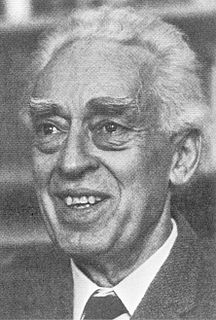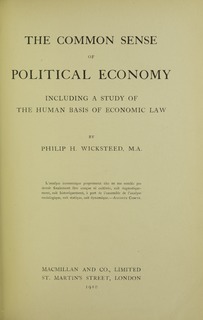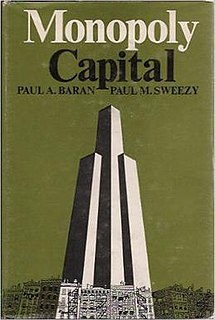Related Research Articles

David Ricardo was a British political economist, one of the most influential of the classical economists along with Thomas Malthus, Adam Smith and James Mill.
The labor theory of value (LTV) is a theory of value that argues that the economic value of a good or service is determined by the total amount of "socially necessary labor" required to produce it.

Piero Sraffa was an influential Italian economist who served as lecturer of economics at the University of Cambridge. His book Production of Commodities by Means of Commodities is taken as founding the neo-Ricardian school of economics.

Philip Henry Wicksteed is known primarily as an economist. He was also a Georgist, Unitarian theologian, classicist, medievalist, and literary critic.
Paul Marlor Sweezy was a Marxist economist, political activist, publisher, and founding editor of the long-running magazine Monthly Review. He is best remembered for his contributions to economic theory as one of the leading Marxian economists of the second half of the 20th century.
Maurice Herbert Dobb was a British economist at Cambridge University and a Fellow of Trinity College, Cambridge. He is remembered as one of the pre-eminent Marxist economists of the 20th century.
The tendency of the rate of profit to fall (TRPF) is a hypothesis in the crisis theory of political economy, according to which the rate of profit—the ratio of the profit to the amount of invested capital—decreases over time. This hypothesis gained additional prominence from its discussion by Karl Marx in Chapter 13 of Capital, Volume III, but economists as diverse as Adam Smith, John Stuart Mill, David Ricardo and Stanley Jevons referred explicitly to the TRPF as an empirical phenomenon that demanded further theoretical explanation, although they differed on the reasons why the TRPF should necessarily occur.

Criticism of Marxism has come from various political ideologies and academic disciplines. This includes general criticism about a lack of internal consistency, criticism related to historical materialism, that it is a type of historical determinism, the necessity of suppression of individual rights, issues with the implementation of communism and economic issues such as the distortion or absence of price signals and reduced incentives. In addition, empirical and epistemological problems are frequently identified.
Ronald Lindley Meek, also known as Ron Meek, was a Marxian economist and social scientist known especially for his scholarly studies of classical political economy and the labour theory of value. During the 1960s and 1970s, his writings had a strong influence on the Western academic discussion about Marx's economic theory.

Monopoly Capital: An Essay on the American Economic and Social Order is a 1966 book by the Marxian economists Paul Sweezy and Paul A. Baran. It was published by Monthly Review Press. It made a major contribution to Marxian theory by shifting attention from the assumption of a competitive economy to the monopolistic economy associated with the giant corporations that dominate the modern accumulation process. Their work played a leading role in the intellectual development of the New Left in the 1960s and 1970s. As a review in the American Economic Review stated, it represented "the first serious attempt to extend Marx’s model of competitive capitalism to the new conditions of monopoly capitalism." It attracted renewed attention following the Great Recession.

Anwar M. Shaikh is a Pakistani American heterodox economist in the tradition of classical political economy.

The Theory of Capitalist Development is a 1942 book by the Marxian economist Paul Sweezy, in which the author expounds and defends the labor theory of value. It has received praise as an important work, but Sweezy has also been criticized for misrepresenting Karl Marx's economic theories.

Marx after Sraffa is a 1977 book about Marxist economics by the economist Ian Steedman, in which the author argues against the labor theory of value. Steedman has been criticized for alleged misunderstandings of Karl Marx.
Duncan K. Foley is an American economist. He is the Leo Model Professor of Economics at the New School for Social Research and an External Professor at the Santa Fe Institute. Previously, he was Associate Professor of Economics at MIT and Stanford, and Professor of Economics at Columbia University. He has held visiting professorships at Woodrow Wilson School at Princeton University, UC Berkeley, and Dartmouth College, as well as the New School for Social Research.

Neo-Marxism is a Marxist school of thought encompassing 20th-century approaches that amend or extend Marxism and Marxist theory, typically by incorporating elements from other intellectual traditions such as critical theory, psychoanalysis, or existentialism.

Marxian economics, or the Marxian school of economics, is a heterodox school of political economic thought. Its foundations can be traced back to the critique of classical political economy in the research by Karl Marx and Friedrich Engels. Marxian economics comprises several different theories and includes multiple schools of thought, which are sometimes opposed to each other, and in many cases Marxian analysis is used to complement or supplement other economic approaches. Because one does not necessarily have to be politically Marxist to be economically Marxian, the two adjectives coexist in usage rather than being synonymous. They share a semantic field while also allowing connotative and denotative differences.
Krishna Bharadwaj was an Indian Neo-Ricardian economist mainly known for her contributions to the economic development theory and the revival of the ideas of classical economics. She believed that economic theory should be based on concepts which can be observed and be amenable to measurement in reality.
Bertram Schefold is a Swiss economist and an Economics professor at the Goethe University in Frankfurt am Main specializing in economic theory with a particular focus on capital theory and the history of economic thought.

There are five main lines of scholarly criticism of Marx's idea of the form of value.
References
- ↑ "Abstract Steedman". www-gewi.kfunigraz.ac.at.
- ↑ "rae 2008 : submissions : ra5a". www.rae.ac.uk.
- ↑ http://www.routledgeeconomics.com/books/Economic-Theory-and-Economic-Thought-isbn9780415465113 Economic Theory and Economic Thought, Essays in honour of Ian Steedman Edited by John Vint, J. Stanley Metcalfe, Heinz D. Kurz, Neri Salvadori, Paul Samuelson ISBN 978-0-415-46511-3 Routledge 2009
- ↑ http://www.wtf.org.uk/ Archived 2010-01-06 at the Wayback Machine William Temple Foundation
- ↑ http://www.tandf.co.uk/journals/journal.asp?issn=0967-2567&linktype=5 The European Journal of the History of Economic Thought